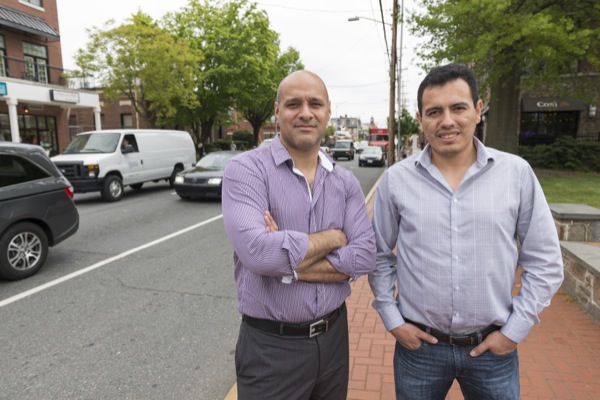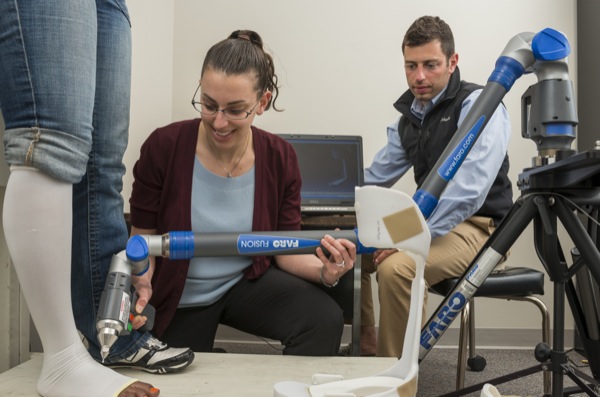


Engineering an entrepreneur
Nontraditional NSF grant puts UD researchers on fast track to new ideas
11:17 a.m., May 14, 2013--University of Delaware professor John Cavazos is feeling a little frazzled these days. In addition to teaching classes on campus, the aspiring entrepreneur is meeting with 100 business owners in seven weeks to learn whether his ideas have business potential.
The exercise is part of his new National Science Foundation Innovation Corps (I-Corps) grant, awarded through a program aimed at equipping entrepreneurial hopefuls with the skills to successfully start a business and take research ideas from concept to commercial product.
Research Stories
Chronic wounds
Prof. Heck's legacy
Twenty-one teams composed of academic researchers, student entrepreneurs and business mentors were selected nationwide for 2013. Cavazos’ group earned one of two I-Corps grants awarded to UD. The other went to a team led by Elisa Schrank, a post-doctoral researcher in kinesiology and applied physiology.
The I-Corps program includes an intensive three-day workshop where participants hear lectures from entrepreneurial leaders then present their ideas and begin developing business plans. Students serve as the entrepreneurial lead, placing them on equal footing with the grant’s principal investigator, while business mentors provide advice and open doors.
A major component of the program, called “get out of the building,” requires participants to interview customers to understand the market’s true needs and determine if their ideas fit the bill. “They often don’t even want us mentioning our technology because the goal is to listen to the customers,” explained Schrank.
Also key is what Cavazos calls the “pivot moment.”
“This is when your business concept evolves and changes based on what the interviews reveal,” said Cavazos, professor of computer and information sciences.
Cavazos’ I-Corps team includes post-doctoral researcher Marco Alvarez and mentor Ed Henckler, a business strategist from Philadelphia. They plan to develop a system that can detect real-time traffic congestion from surveillance videos using computer vision techniques and machine learning. The goal is not to solve the problem of congestion, rather to give transportation folks tools to mitigate congestion by getting help to problem areas sooner or by setting up alerts that can slow the flow of traffic toward an affected area before a bottleneck occurs.
The team has already met with transportation representatives in Delaware, Illinois and Pennsylvania, in addition to attending a national transportation systems meeting in Tennessee. Cavazos shared that while their product is still evolving, the experience is already changing the way he teaches and advises students.
“Now when students come to me with an idea I automatically ask, ‘who are your customers?’” he said.
Schrank’s team includes Alex Razzook, a doctoral student in the Biomechanics and Movement Science (BIOMS) Program, and business mentor Ted Foltyn. They propose a unique manufacturing framework to develop customized ankle foot orthoses, an ankle brace for individuals with muscle weakness. The technology harnesses the strengths of modern tools, including 3D digitizing and computer aided design and solid freeform fabrication, to precisely customize and rapidly manufacture prosthetics and orthotics.
Early discussions with manufacturers and clinicians locally and in Atlanta, Florida, Illinois and New York have already revealed some challenging hurdles. “Helping clinicians who take pride in their customization skills see the value in using technology to their advantage without taking away their creativity is difficult. We are realizing how large the discrepancies are between researchers and an audience who often do their job ‘by feel,’ and figuring out how to bridge those gaps,” said Schrank.
Remarking on why students fill the role of the team’s entrepreneurial lead, Razzook commented, “I think it comes down to risk — who is more likely to step away from a university and help a product take off commercially.”
No stranger to the start-up world, in 2012 Razook received $4,700 in funding from the Hen Hatch, UD’s premier business startup funding competition, for his unique startup Mobiletech Orthopedics, which featured a patented prosthetic design.
He said he is excited to add tools gained through I-Corps to his skill set as he begins his career. “If I decide to pursue an idea, I now understand how to research it up front and know before I move forward whether the technology has commercial viability,” he said.
“[The program] definitely gives a different perspective,” concluded Schrank. “It’s not enough to create a great technology that no one cares about.”
Article by Karen B. Roberts
Photos by Evan Krape and Kathy F. Atkinson









